Career and Life Readiness 2025-2026
The Career and Life Readiness courses are organized in a sequence from 1 to 10. It is recommended that participants take the courses in this order to maximize their learning experience, as each course builds upon the knowledge and skills acquired in the previous one. This structured progression ensures a comprehensive understanding of the material and better prepares participants to support students’ career and life readiness effectively. Each course can be taken as a standalone if preferred.
The Career and Life Readiness courses below are all Self-Paced Micro Courses. This means they are short, focused courses targeting specific skills or knowledge areas, perfect for professionals seeking quick, actionable insights that can be applied immediately. These courses provide flexibility for learners who want to enhance their expertise in targeted areas in approximately 1-2 hours.

Course 1
Creating a Career and Life Readiness Team
Course Join Code: BMWC38
Course Description
Primary Instructor: Shana Ratzburg
Course Join Code: BMWC38
Course Description:
Creating a career and life readiness team is the first step toward district staff embracing a culture of career readiness to improve outcomes for all students. Participants in this course will gain an understanding of the importance of creating or enhancing career and life readiness programming with a team approach, identify the mindsets and beliefs important to be held by individuals on the team, evaluate whether to enhance an existing career and life readiness or related team or create a new team, and understand how the Wisconsin Career Readiness Standards can be used by the team to identify what knowledge, skills, and habits all students should know by the time they graduate from high school. This is a free, self-paced course featuring asynchronous learning and an assignment. It was developed by the Wisconsin Transition Improvement Grant.

Course 2
Academic and Career Planning (ACP)
Course Join Code: G6MTP3
Course Description
Primary Instructor: Shana Ratzburg
Course Join Code: G6MTP3
Course Description
Supporting students while they are in school to learn about careers and engage in hands-on real-work experiences, as well as goal setting, decision-making and self advocacy, are paramount for postsecondary goal attainment (Source: NTACT:C Predictors of Post-School Success). Early career exploration allows time for students to discover careers and determine if they align with their preferences, interests, needs, and strengths. In Wisconsin, Academic and Career Planning (ACP) is the process by which career readiness, as the goal, happens. Academic and Career Planning is a state requirement of Wisconsin public school districts and is required to be provided to students in grades 6-12, including students with disabilities. Participants in this course will understand the state requirements, stages, and components of ACP, commit to creating a school-wide ACP culture, and examine ACP in their own district. This is a free, self-paced course featuring asynchronous learning and an assignment. It was developed by the Wisconsin Transition Improvement Grant.

Course 3
The Postsecondary Transition Plan (PTP)
Course Join Code: 3LMA8L
Course Description
Primary Instructor: Shana Ratzburg
Course Join Code: 3LMA8L
Course Description
Planning for life after high school is an integral piece of quality education. The Academic and Career Planning process begins in the 6th grade for all students. Transition planning takes place by the time a student with a disability is 14 years old. For students with disabilities, the Academic and Career Planning process intersects with transition, which is the focus of this course. Participants in this course will recognize the legal requirements of transitioning planning as part of the Individualized Education Program (IEP) for students with disabilities, identify the required components of the Postsecondary Transition Plan (PTP), understand Indicator 13 as a Wisconsin State Performance Plan Indicator, and utilize the Wisconsin Transition App with students and families. This is a free, self-paced course featuring asynchronous learning and an assignment. It was developed by the Wisconsin Transition Improvement Grant.
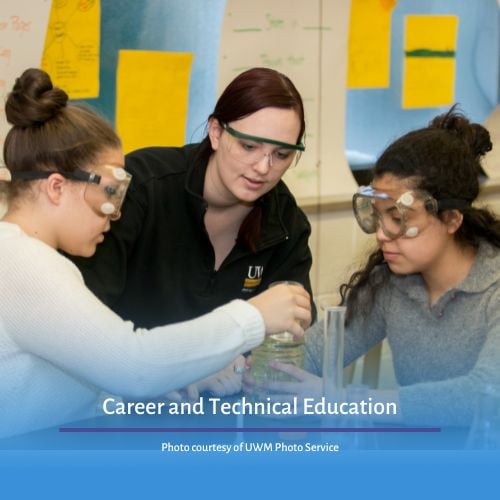
Course 4
Career and Technical Education (CTE)
Course Join Code: R3TEHP
Course Description
Primary Instructor: Shana Ratzburg
Course Join Code: R3TEHP
Course Description
Many students leave high school with little to no real-world work experiences. Compounding this, students with disabilities often face employment barriers leading to unemployment or underemployment. It is crucial for students with disabilities to acquire the knowledge and skills necessary to achieve their employment goals, compete in the workforce, and lead independent lives. Career and Technical Education provides high school students the training and skills they need to be successfully employed after graduation or prepared to attend postsecondary education. Participants in this course will identify the quality components and benefits of CTE, examine CTE offerings in their own district, recognize how Regional Career Pathways (RCP) are formed collaboratively, and determine locally if and which RCP maps are being utilized. This is a free, self-paced course featuring asynchronous learning and an assignment. It was developed by the Wisconsin Transition Improvement Grant.
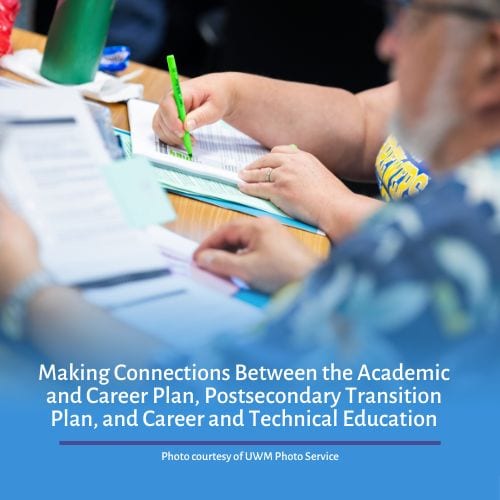
Course 5
Making Connections Between the ACP, PTP, and CTE
Course Join Code: 3T4386
Course Description
Primary Instructor: Shana Ratzburg
Course Join Code: 3T4386
Course Description
It is important for Career and Life Readiness/Academic and Career Planning Teams to align efforts as they form a common understanding of Academic and Career Planning (ACP), the Postsecondary Transition Plan (PTP), and Career & Technical Education (CTE). These three work in tandem to help students with disabilities develop a post high school action plan to attain their career and life goals. This micro course will discuss the overlap between ACP, PTP, and CTE and how each informs the others and are necessary for student success. Participants in this course will identify how ACP, PTP, and CTE complement and support the other, relate the importance of increasing staff awareness of career-related opportunities to inform students and families, and establish the connection between ACP activities, CTE opportunities, and transition services within the PTP. This is a free, self-paced course featuring asynchronous learning and an assignment. It was developed by the Wisconsin Transition Improvement Grant.

Course 6
Using Data to Assess/Identify Disparities & Increase Engagement
Course Join Code: T8JEX6
Course Description
Primary Instructor: Shana Ratzburg
Course Join Code: T8JEX6
Course Description
Engagement in career readiness activities, especially Career and Technical Education (CTE) courses and programs, increases the likelihood of students with disabilities graduating from high school career and life ready. Barriers and strategies should be examined to ensure that students are accessing CTE courses and programs, having their individual needs met, and finding success. The first step to ensure that ALL students have access to CTE is to review local data to identify who is and who isn’t participating in CTE opportunities. Participants in this course will explain the importance of special populations and the Strengthening Career and Technical Education for the 21st Century Act (Perkins V), review and disaggregate local student data to determine if students with disabilities are not accessing CTE opportunities, and identify strategies to eliminate barriers to participation and success. This is a free, self-paced course featuring asynchronous learning and an assignment. It was developed by the Wisconsin Transition Improvement Grant.

Course 7
Career-Based Learning Experiences
Course Join Code: CLGTNW
Course Description
Primary Instructor: Shana Ratzburg
Course Join Code: CLGTNW
Course Description
Exploring careers through experiential learning is a critical component of Academic and Career Planning (ACP). Some of these activities, referred to as career-based learning experiences (CBLEs), directly involve employers or business partners. Participants in this course will describe the continuum of activities and guidance within the Wisconsin Guide to Implementing Career-Based Learning Experiences (CBLE Guide, WI DPI), recognize the importance of career-based learning experiences and work-based learning for students with disabilities, acknowledge that providing CBLEs early sets a foundation and path for work-based learning, and gain comfort in utilizing the CBLE Guide to implement CBLEs. This is a free, self-paced course featuring asynchronous learning and an assignment. It was developed by the Wisconsin Transition Improvement Grant.

Course 8
Work-Based Learning
Course Join Code: YAJJYR
Course Description
Primary Instructor: Shana Ratzburg
Course Join Code: YAJJYR
Course Description
Work-based learning experiences are a subset of career-based learning experiences that must meet six quality criteria. This micro course covers the six quality criteria and components of work-based learning, explores the various types of work-based learning, and provides strategies to help students with disabilities succeed in these programs. The Wisconsin’s Guide to Implementing Career-Based Learning Experiences (CBLE Guide) will be a key resource in this course and was introduced in the Career-Based Learning Experiences Micro Course. Participants will also recognize the importance and variety of work-based learning for students with disabilities and gain comfort in utilizing the CBLE Guide to implement work-based learning for students with disabilities. This is a free, self-paced course featuring asynchronous learning and an assignment. It was developed by the Wisconsin Transition Improvement Grant.

Course 9
Institutions of Higher Education
Course Join Code: BXD4W9
Course Description
Primary Instructor: Shana Ratzburg
Course Join Code: BXD4W9
Course Description
As Individualized Education Program (IEP) Teams, including students and families, develop transition plans each year, measurable postsecondary goals in the areas of education, training, and employment are identified. Once a student has identified a career/employment goal, the student and IEP Team explore the education or training necessary to reach that employment goal. According to the Bureau of Labor Statistics, U.S. Department of Labor, individuals with a disability were less likely to have completed a bachelor’s degree or higher than were those with no disability. Among both groups, those who had attained higher levels of education were more likely to be employed than those who had attained less education. Participants in this course will identify ways in which students with disabilities can earn college credits while in high school, be intentional about advanced planning, documentation, and early conversations with students and families about accommodations, services, and supports, recognize differences between the Individuals with Disabilities Education Act (IDEA) and the Americans with Disabilities Act (ADA), and provide opportunities for students with disabilities to practice self-advocacy skills while in high school. This is a free, self-paced course featuring asynchronous learning and an assignment. It was developed by the Wisconsin Transition Improvement Grant.

Course 10
Community Partnerships
Course Join Code: X8AJ9R
Course Description
Primary Instructor: Shana Ratzburg
Course Join Code: X8AJ9R
Course Description
Many programs within districts, such as Academic and Career Planning, the Postsecondary Transition Plan, Career and Technical Education, career-based learning experiences, and work-based learning often overlap and are interconnected. These are significant tasks for a district to handle alone. The essential component needed to make this a reality is forming collaborative partnerships beyond the school walls. School-community partnerships are vital for successful schools, providing a true bridge to career and life readiness. Participants in this course will Illustrate connecting with outside agencies early and often for students with disabilities, recognize how the Division of Vocational Rehabilitation (DVR) and educators can work together to provide transition services for students with disabilities, enhance working relationships with local DVR counselors, recognize the benefit of increased connection and engagement with employers, and recognize how employers and educators can work together to provide career-based learning experiences and work-based learning opportunities for students with disabilities. This is a free, self-paced course featuring asynchronous learning and an assignment. It was developed by the Wisconsin Transition Improvement Grant.


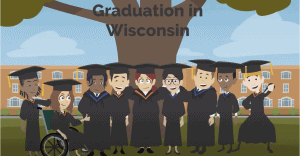
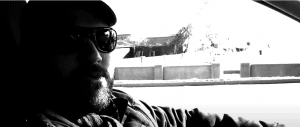
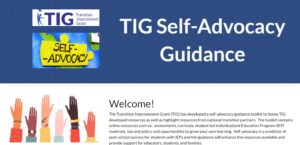 TIG Self-Advocacy Guidance Google Site
TIG Self-Advocacy Guidance Google Site 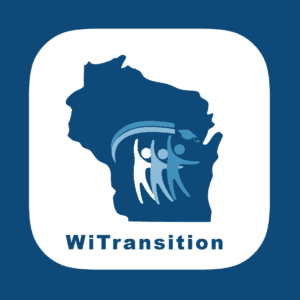
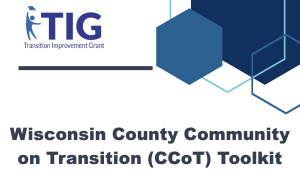 Wisconsin County Community on Transition (CCoT) Toolkit
Wisconsin County Community on Transition (CCoT) Toolkit